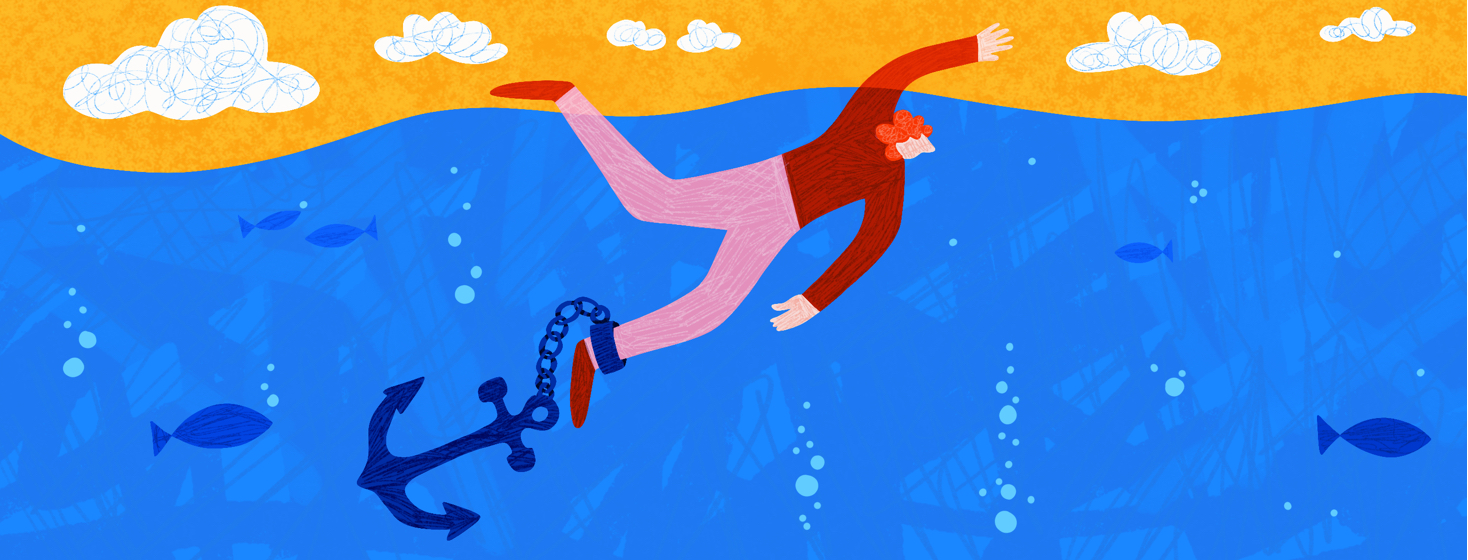Is Chronic Illness My Entire Identity Now?
When I got seriously sick and diagnosed with axial spondyloarthritis in 2017 — I mean, I'd had symptoms (uveitis, fatigue, stomach issues, light back pain) for a decade but we didn't know what was going on — AS became a sort of anchor for me.
But I am not sure if I mean that in a good way.
It anchored me to my body (I was always aware of my body: its pain, its newfound lack of mobility, its depleted reserves).
I was always worried
It anchored me to my state of mind (I was always worried about what AS meant for my future, how I would adapt; I cried all the time and felt a sense of failure and — for the first time, literally ever — a newfound sense of mortality. Where I once simply lived and enjoyed the moment, I developed anxiety over death and felt weak in my own existence; I still feel this way, and in some way, it's gotten worse).
It anchored me to my family genetics. I learned that my father and aunt had it and that my grandmother probably did too. It became this monster-thing that I'd inherited, that was always going to be there. It made me think about what else could be hidden in my blood. It made me think of generations of Sicilian and Mediterranean people passing this disease down the line.
It was always there, pulling me, dragging me, rooting me to myself.
It was literally an anchor
My spine. The seat of my body. The thing that holds me together.
It became an all-encompassing thing, simply by its very obvious existence. If I was in pain or exhausted or unable to work out, it was AS. If I felt good, it was AS giving me relief, a day off. It was never not AS.
So I started writing about it — a lot. As a writer by profession, the opportunity to share my experience led to bylines everywhere. Suddenly, I was an advocate for other AS and chronically ill patients. Suddenly I was the person with a story and a voice for sharing it. Suddenly I was getting DMs and offers to write articles and questions from pharma companies. I was a person with AS doing AS things. I was telling friends I was in pain, canceling plans, becoming known as the girl with pain and exhaustion. I was being asked by family how am I. I was hiding the fact that I was in pain so it wasn't all about me. I hated it.
But I was also posting about it on Instagram and getting likes. And shares. I wanted to communicate with my fellow spoonies but I didn't want to be seen as just a sick girl.
We share because we want community, and people like and support and follow people like me because they want to be validated in their experiences, they want to feel less alone, they want to see that others get it, they want to know their pain is real, they want to know that the weird, nuanced, liminal roller coaster of disease isn't just all in their heads and people like me supply that. We create collective healing, a conversation, a way forward, a light in the dark. And that's beautiful.
But was that — is that — all of me? It felt so all-consuming, so defining, so real. It felt like AS was becoming my
I wasn't and am not just a person with AS, though. And I do not want to be.
I'm more than my diagnosis
I am a poet. I am an essayist. I am a daughter. I'm a former foster youth and foster youth advocate. I'm a survivor. I'm a Master's degree holder. I'm an editor. I'm the founder of a magazine. I'm a girlfriend. I'm a dancer. I'm a swimmer. I'm a cat freak. I am a New Yorker. I'm so many things.
So part of me wonders:
How do I embrace all of me? How do I share all of me? Why do I worry that the AS will consume me? How do I balance my identities? How can I strike a balance between finding community on social media and letting the face that I show the world be just an AS face? How important is it to embrace the identity of disability, and how does this help others? How important is it to embrace the idea that disability is but a part of us, not the whole? Why do I feel shame around this, anyway? Do I feel like if I give myself over to this identity it will consume me? Is it possible that not letting it take over will keep it from feeling overwhelmingly awful?
I don't have the answers. I simply know this: Living with a disease is like living with a shadow. It's on a leash, and you're walking it — or it's walking you. How do you not pay attention?
But also, how do you go on living your life? How do you take yourself back?

Join the conversation